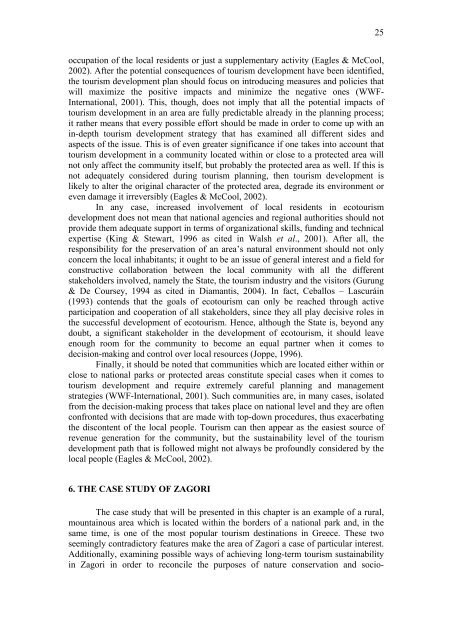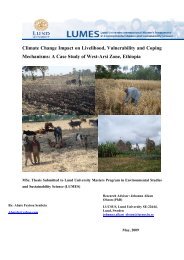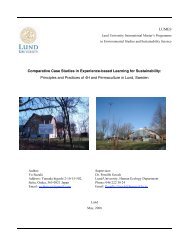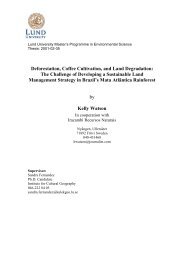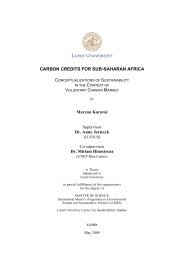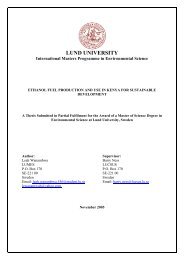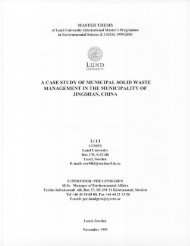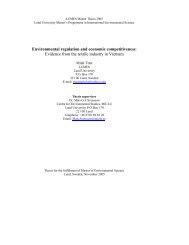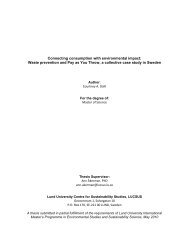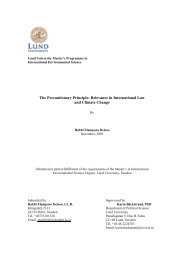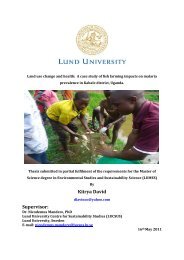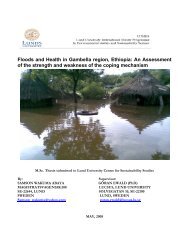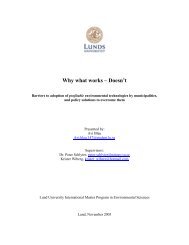Thesis title: âThe development of community-based ecotourism - lumes
Thesis title: âThe development of community-based ecotourism - lumes
Thesis title: âThe development of community-based ecotourism - lumes
You also want an ePaper? Increase the reach of your titles
YUMPU automatically turns print PDFs into web optimized ePapers that Google loves.
25occupation <strong>of</strong> the local residents or just a supplementary activity (Eagles & McCool,2002). After the potential consequences <strong>of</strong> tourism <strong>development</strong> have been identified,the tourism <strong>development</strong> plan should focus on introducing measures and policies thatwill maximize the positive impacts and minimize the negative ones (WWF-International, 2001). This, though, does not imply that all the potential impacts <strong>of</strong>tourism <strong>development</strong> in an area are fully predictable already in the planning process;it rather means that every possible effort should be made in order to come up with anin-depth tourism <strong>development</strong> strategy that has examined all different sides andaspects <strong>of</strong> the issue. This is <strong>of</strong> even greater significance if one takes into account thattourism <strong>development</strong> in a <strong>community</strong> located within or close to a protected area willnot only affect the <strong>community</strong> itself, but probably the protected area as well. If this isnot adequately considered during tourism planning, then tourism <strong>development</strong> islikely to alter the original character <strong>of</strong> the protected area, degrade its environment oreven damage it irreversibly (Eagles & McCool, 2002).In any case, increased involvement <strong>of</strong> local residents in <strong>ecotourism</strong><strong>development</strong> does not mean that national agencies and regional authorities should notprovide them adequate support in terms <strong>of</strong> organizational skills, funding and technicalexpertise (King & Stewart, 1996 as cited in Walsh et al., 2001). After all, theresponsibility for the preservation <strong>of</strong> an area’s natural environment should not onlyconcern the local inhabitants; it ought to be an issue <strong>of</strong> general interest and a field forconstructive collaboration between the local <strong>community</strong> with all the differentstakeholders involved, namely the State, the tourism industry and the visitors (Gurung& De Coursey, 1994 as cited in Diamantis, 2004). In fact, Ceballos – Lascuráin(1993) contends that the goals <strong>of</strong> <strong>ecotourism</strong> can only be reached through activeparticipation and cooperation <strong>of</strong> all stakeholders, since they all play decisive roles inthe successful <strong>development</strong> <strong>of</strong> <strong>ecotourism</strong>. Hence, although the State is, beyond anydoubt, a significant stakeholder in the <strong>development</strong> <strong>of</strong> <strong>ecotourism</strong>, it should leaveenough room for the <strong>community</strong> to become an equal partner when it comes todecision-making and control over local resources (Joppe, 1996).Finally, it should be noted that communities which are located either within orclose to national parks or protected areas constitute special cases when it comes totourism <strong>development</strong> and require extremely careful planning and managementstrategies (WWF-International, 2001). Such communities are, in many cases, isolatedfrom the decision-making process that takes place on national level and they are <strong>of</strong>tenconfronted with decisions that are made with top-down procedures, thus exacerbatingthe discontent <strong>of</strong> the local people. Tourism can then appear as the easiest source <strong>of</strong>revenue generation for the <strong>community</strong>, but the sustainability level <strong>of</strong> the tourism<strong>development</strong> path that is followed might not always be pr<strong>of</strong>oundly considered by thelocal people (Eagles & McCool, 2002).6. THE CASE STUDY OF ZAGORIThe case study that will be presented in this chapter is an example <strong>of</strong> a rural,mountainous area which is located within the borders <strong>of</strong> a national park and, in thesame time, is one <strong>of</strong> the most popular tourism destinations in Greece. These twoseemingly contradictory features make the area <strong>of</strong> Zagori a case <strong>of</strong> particular interest.Additionally, examining possible ways <strong>of</strong> achieving long-term tourism sustainabilityin Zagori in order to reconcile the purposes <strong>of</strong> nature conservation and socio-


